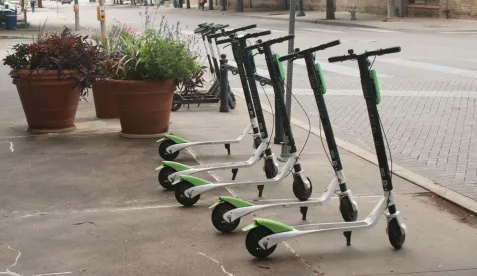In a flurry of year-end activity, New York’s Governor Andrew Cuomo issued a series of legislative vetoes – at least three of which should be of interest to our readers.
Governor Cuomo Put the Brakes on the Use and Regulation of E-Scooters and E-Bicycles in NY
First, the Governor vetoed legislation (Senate Bill A5294A and Assembly Bill A7431) that would have amended the state’s Vehicle and Traffic Law to allow the statewide use of electric scooters and electronic bicycles. The two bills previously passed the state’s Senate and Assembly without significant opposition, so the Governor’s veto came as a surprise. Supporters of the legislation argued that the use of these electronic bikes and scooters was a safe, sustainable and affordable way of replacing automobile traffic, citing the experience of major cities across the United States, such as Phoenix and Denver, that already passed legislation to allow them. Noting that New York was one of the few remaining jurisdictions in the country yet to “legalize and define” the devices, they argued that local delivery workers were particularly subject to police enforcement of existing laws and that a change to legalization would create jobs and enhance income in the process.
Despite these arguments, the Governor’s veto message called the proposed law “fatally flawed” because it did not include enough safety measures. Cuomo said legislators “inexplicably omitted several of the safety measures” included in his initial budget proposal to legalize electronic bikes and electronic scooters, such as mandatory helmets, lower speed limits and a law against using the vehicles if a rider was impaired by drugs or alcohol. Cuomo cited the death of a 16-year-old in Elizabeth, New Jersey, who was killed when he was struck by a truck while riding his electronic scooter.
Cuomo’s veto does not appear to oppose the actual concept of regulating the use of electronic bikes and scooters, and it seems that the Governor would be amenable to approving a bill that contains the safety provisions he wants. The bill’s sponsors have already signaled additional efforts to have a bill passed into law, so a revised bill on the Governor’s desk in 2020 is highly likely.
Governor Cuomo Vetoed Legislation to Change NY Tort Law
The Governor’s second veto of note involved legislation (Senate Bill S6081 and Assembly Bill A2372) that, in tort cases involving multiple defendants, would have changed New York’s General Obligation Law to require a non-settling defendant to elect, prior to trial, whether to reduce its potential liability by the amount paid by a settling defendant or by the equitable share of damages assigned to the settling defendant by the jury’s verdict.
New York’s General Obligation Law currently gives the non-settling defendant automatic protection; that is, in the event of an adverse verdict, the non-settling defendant enjoys an automatic offset of the amount paid by the settling defendant or the settling defendant’s equitable share of damages assigned to it by the jury in its verdict – whichever amount is greater. This happens by operation of law; no “guesswork” is required.
Opponents of the proposed law, including various physician and hospital advocacy groups obviously concerned by the bill’s potential impact on medical malpractice cases, called it a giveaway to the Plaintiff’s Bar. They argued that the bill would have forced non-settling defendants to engage in a crapshoot without knowing the ultimate outcome of the trial. If the non-settling defendant made the wrong choice, a plaintiff could receive a recovery above what the jury actually awarded.
Governor Cuomo Vetoed Legislation to Expand Liability for Third-Party Defendants
Cuomo’s third veto of note involved legislation (Senate Bill S6552 and Assembly Bill A2373) that would have amended the state’s Civil Practice Law and Rules to permit a plaintiff in certain cases to recover directly from a third-party defendant found liable to the direct defendant in contribution or indemnity. For example, in a case where a defendant/third-party plaintiff is insolvent and is unable to pay the judgment to the plaintiff, the plaintiff under the vetoed bill could have sought to recover directly that portion of the judgment owed by the third-party defendant to the defendant/third-party plaintiff. Opponents of the measure argued that the legislation would allow plaintiffs to bypass defendants and collect directly from a party over whom they had no legal standing to sue and would have allowed plaintiffs to collect directly from a third-party defendant after the statute of limitations has expired, exposing third-party defendants to open-ended liability.



 />i
/>i
